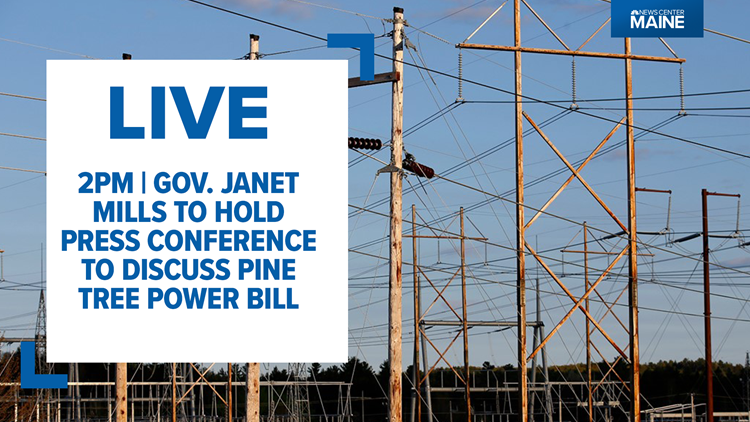AUGUSTA, Maine — Gov. Janet Mills is holding a press conference at 2 p.m. Tuesday to announce her decision on LD 1708, An Act to Create the Pine Tree Power Company.
The bill would create a nonprofit, consumer-owned utility that would take over Central Mainer Power and Versant Power.
If the governor signs the bill or it expires on her desk, Maine people would have the opportunity to vote on the proposal in a statewide referendum question in November.
The question would be posed as follows:
"Do you favor the creation of the Pine Tree Power Company, a nonprofit, privately operated utility governed by a board elected by Maine voters, to replace Central Maine Power and Versant Power, without using tax dollars or state bonds, and to focus on delivering reliable, affordable electricity and meeting the State's energy independence and Internet connectivity goals?"
If Mainers vote in favor, the subject would be on Maine ballots once again in November 2022, when voters would elect seven people from around the state to sit on the board that would run Pine Tree Power.
After that group of seven is elected, proponents expect it will spend approximately a year crafting a proposal for CMP and Versant. If there is a smooth transition, the earliest that would take place is 2025.
However, looking at similar attempts around the county, opponents of the bill already speculate Pine Tree Power's plan to overtake CMP and Versant as Maine's primary electric provider would result in a length and costly legal battle.
"Maine Affordable Energy" is a campaign, backed by CMP, the Maine State Chamber, and others, that has emerged in response to the Pine Tree Power proposal.
Maine Affordable Energy Executive Director Willy Ritch says a lengthy legal battle is all but inevitable.
"If somebody came to you and said, I'm going to give you half of what your home is worth, you're not going to just give it to them, you're going to push back and you're going to fight," Ritch said.
The legislator behind the proposal, Representative Seth Berry, D-Bowdoinham, says the legislation is structured in preparation for that legal battle.
"[The takeover] could be either negotiated or, if necessary, litigated," Berry said. "The bill does provide a legal settlement if necessary."
The interests of the elected board on representatives is a central point of debate between those in support of or opposed to the plan.
"Pine Tree Power Company would be separate from the state entirely. It's not a state takeover," Berry said.
Opponent Ritch has the opposite take, saying, "Let's be very clear about this, this would be a government-run entity. If something is run by a bunch of elected officials, it is the government."
Berry argues that Pine Tree Power is the solution to Maine's energy issues. He points to CMP and Versant's records of poor reliability and high rates as why a privately operated utility would serve Mainers better.
"We're at the bottom of the barrel right now, and things can only improve... for over 100 years we've tried to have the regulators solve the problem and they can't. They've failed in every way," Berry said.
Berry said this model of service is growing increasingly popular around the country and is already in use in parts of Maine.
"97 Maine towns are served by a consumer-owned utility—at least in part—and it works much better... costs are far lower," Berry said.
Ritch, however, said it's a gross oversimplification to compare utilities that cater to small regions or single towns to one that would encompass a majority of the state.
"It's apples to oranges when you try to compare it to the hundreds of thousands of customers we have in Maine," Ritch said.
Ritch also argued it would be difficult to hold a nonprofit power company accountable.
"If they weren't doing a good job, there wouldn't be any shareholders to fine," Ritch said.



